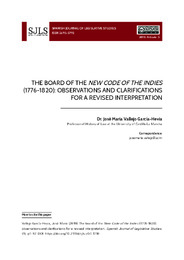Por favor, use este identificador para citar o enlazar este ítem:
https://hdl.handle.net/11000/5641Registro completo de metadatos
| Campo DC | Valor | Lengua/Idioma |
|---|---|---|
| dc.contributor.author | Vallejo García-Hevia, José María | - |
| dc.contributor.other | Departamentos de la UMH::Ciencia Jurídica | - |
| dc.date.accessioned | 2020-01-22T14:16:35Z | - |
| dc.date.available | 2020-01-22T14:16:35Z | - |
| dc.date.created | 2019 | - |
| dc.date.issued | 2020-01-22 | - |
| dc.identifier.issn | 2695-5792 | - |
| dc.identifier.uri | http://hdl.handle.net/11000/5641 | - |
| dc.description.abstract | The study of the formation and the analysis of the content of the well-known New Code of Laws of the Indies, approved, sanctioned and promulgated by Carlos IV of Spain in 1792, but not wholly and generally published, permits new conclusions and a renewed historiographical interpretation about its origin, development and the reasons behind the secrecy of it being in force, with the exception of twelve of its laws, ordered to be applied by the by governmental and judicial authorities of the Indies between 1789 and 1804. Years earlier, in 1776, Carlos III, the King of Spain, had ordered the century-old Law code of the Indies (1680) to be added to and enlightened with the provisions which would be enacted at a later time. However, out of the nine books compiled by order of Carlos II in the late 17th Century, only Book I ended up being proposed and finally accepted by the Board of the New Code created for this purpose in the late 18th Century. This Book was a compilation of Bourbon legislation of the ecclesiastical government of America, which revolved around its key institution the ‘Patronato Real’. Consultation of the preserved minutes of this Board (1776-1785), together with the project of Book I, proposed by Juan Crisóstomo de Ansotegui (1780), among other documentary sources, enables many unanswered questions overshadowing this legislative work to be clarified: why it is an anachronic and partially official Compilation and not a complete enlightened code of laws; the reasons for the Board’s slowness in its disputes with the Royal Council of the Indies; finally, the real causes, beyond traditional ‘regalismo’, for the New Law Code not to be published, when the French Revolution of 1789 reverberated throughout Europe and threatened the stability of its ancient absolutist Monarchies. | es |
| dc.format | application/pdf | es |
| dc.format.extent | 57 | es |
| dc.language.iso | eng | es |
| dc.relation.ispartofseries | 1 | es |
| dc.rights | info:eu-repo/semantics/openAccess | es |
| dc.subject | Código | es |
| dc.subject | Recopilación | es |
| dc.subject | Ley | es |
| dc.subject | América | es |
| dc.subject | Real Consejo de las Indias | es |
| dc.subject | Gobierno eclesiástico | es |
| dc.subject.other | CDU::3 - Ciencias sociales::Derecho: 34 | es |
| dc.title | The board of the New Code of the Indies (1776-1820): Observations and clarifications for a revised interpretation | es |
| dc.type | info:eu-repo/semantics/article | es |
| dc.identifier.doi | 10.21134/sjls.v0i1.1710 | - |
| dc.relation.publisherversion | https://doi.org/10.21134/sjls.v0i1.1710 | - |

Ver/Abrir:
Vallejo García-Hevia, José María.pdf
2,21 MB
Adobe PDF
Compartir:
 La licencia se describe como: Atribución-NonComercial-NoDerivada 4.0 Internacional.
La licencia se describe como: Atribución-NonComercial-NoDerivada 4.0 Internacional.
.png)